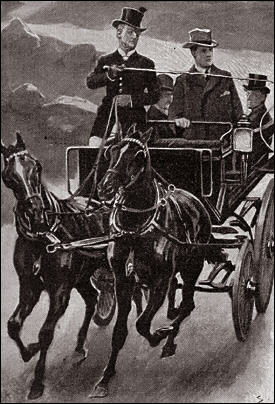| Baskerville Hall 3 | Baskerville Hall 4 |
A steep curve of heath-clad land, an outlying spur of the moor, lay in front of us. On the summit, hard and clear like an equestrian statue upon its pedestal, was a mounted soldier, dark and stern, his rifle poised ready over his forearm. He was watching the road along which we travelled.
“What is this, Perkins?” asked Dr. Mortimer.
Our driver half turned in his seat.
“There’s a convict escaped from Princetown, sir. He’s been out three days now, and the warders watch every road and every station, but they’ve had no sight of him yet. The farmers about here don’t like it, sir, and that’s a fact.”
“Well, I understand that they get five pounds if they can give information.”
“Yes, sir, but the chance of five pounds is but a poor thing compared to the chance of having your throat cut. You see, it isn’t like any ordinary convict. This is a man that would stick at nothing.”
“Who is he, then?”
“It is Selden, the Notting Hill murderer.”
I remembered the case well, for it was one in which Holmes had taken an interest on account of the peculiar ferocity of the crime and the wanton brutality which had marked all the actions of the assassin. The commutation of his death sentence had been due to some doubts as to his complete sanity, so atrocious was his conduct. Our wagonette had topped a rise and in front of us rose the huge expanse of the moor, mottled with gnarled and craggy cairns and tors. A cold wind swept down from it and set us shivering. Somewhere there, on that desolate plain, was lurking this fiendish man, hiding in a burrow like a wild beast, his heart full of malignancy against the whole race which had cast him out. It needed but this to complete the grim suggestiveness of the barren waste, the chilling wind, and the darkling sky. Even Baskerville fell silent and pulled his overcoat more closely around him.
We had left the fertile country behind and beneath us. We looked back on it now, the slanting rays of a low sun turning the streams to threads of gold and glowing on the red earth new turned by the plough and the broad tangle of the woodlands. The road in front of us grew bleaker and wilder over huge russet and olive slopes, sprinkled with giant boulders. Now and then we passed a moorland cottage, walled and roofed with stone, with no creeper to break its harsh outline. Suddenly we looked down into a cuplike depression, patched with stunted oaks and firs which had been twisted and bent by the fury of years of storm. Two high, narrow towers rose over the trees. The driver pointed with his whip.
“Baskerville Hall,” said he.

Its master had risen and was staring with flushed cheeks and shining eyes. A few minutes later we had reached the lodge-gates, a maze of fantastic tracery in wrought iron, with weather-bitten pillars on either side, blotched with lichens, and surmounted by the boars’ heads of the Baskervilles. The lodge was a ruin of black granite and bared ribs of rafters, but facing it was a new building, half constructed, the first fruit of Sir Charles’s South African gold.
| Baskerville Hall 3 | Baskerville Hall 4 |